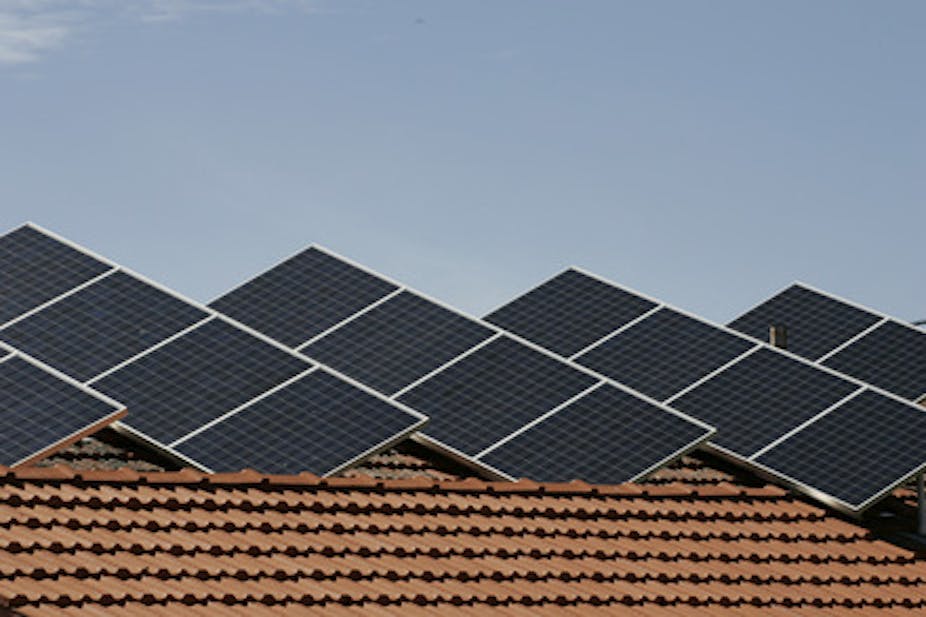Solar panel payments are much in the news of late. NSW Premier Barry O’Farrell has backed down on retrospectively cutting the solar panel payment from 60 cents per kilowatt hour to 40 cents per kilowatt hour.
In the ACT the Labor Government put a cap on the amount supplied by small solar panel electricity suppliers. That cap has now been reached. The result is that the subsidy is no longer available for individual suppliers such as people with panels on their roof.
As a tax lecturer, the sleeper in all of this for me is whether the payments for electricity generated are assessable income.
There are two types of schemes various governments around the country offer or did offer.
In the ACT it was a gross feed-in-tariff. This just meant - before the scheme ended last week - that all of the electricity generated was paid at the subsidised rate.
Net feed in tariffs by contrast only pay the subsidised higher rate for solar panel generated electricity on the amounts supplied over and above the private consumption of the supplier. They net off private consumption.
In my view, solar electricity payments, and I would add the crediting of such payments against consumption, are assessable income. They are payments that flow from property and like other payments flowing from property (such as rent) are assessable income.
Until recently the Commissioner of Taxation in private rulings has said such payments are not income because the taxpayer does not have a profit making intention or is not carrying on a business so the payments are not assessable income.
This in my view is wrong because, as mentioned above, the payments seem to me to be income from property and so should be included in assessable income.
One interesting sidelight to this is that if intention to make a profit is relevant to the income characterisation of returns from property, perhaps the Commissioner should re-examine his position on negatively geared rental properties.
Private rulings are just that – between the Commissioner and the person applying for the ruling. They apply only to them, not to the rest of us. The ATO keeps a register of private rulings where many interesting approaches to tax law can be found.
Public rulings are the ATO’s view on how the law applies to all taxpayers.
Back to solar panel payments. In two more recent private rulings the ATO has said that the payments are income. It is not clear if this shift is based on differences in the factual situations or reflects a re-think on the part of the Commissioner that these amounts are ordinary income per se.
If this latter approach is the one the Commmissioner is now adopting then it is not the particular circumstances of the taxpayer that turns non-assessable payments into assessable income but that people who put solar panels on their roofs do so with an intention to make a profit and hence the payments are assessable income.
Although the situation is not that clear, reading the private rulings, it is my view it could well be this latter approach that the Commissioner has now adopted,
But that is not the end of the matter. In these most recent rulings the Commissioner has also decided that Renewable Energy Certificates sold to installers to reduce the price of the solar panels are assessable recoupments and so their value should be included in the taxpayer’s assessable income.
Finally, if these amounts are assessable income, as I believe and much more importantly the Commissioner apparently believes they are, then any expenditure in gaining or producing them, such as interest on a loan, capital allowances (depreciation) on the capital costs of the panels, repairs and the like will be deductible. I can imagine a spate of negatively geared solar panel claims arising in the future.
Are the credits against consumption also assessable income? Without going into too much detail these appear essentially to be payments for the solar panel electricity generated and paid at the normal consumer rate than the higher subsidised rate.
They appear to be derived by the taxpayer and then offset against ordinary income under the contract the taxpayer has with their electricity provider.
They appear to me on ordinary principles and on provisions in the Income Tax Assessment Act 1997 to be assessable income. The private consumption they are offset against is not an allowable deduction.
There could well be implications for the family home Capital Gains Tax exemption if these solar panel amounts are assessable income.
Further, in the ACT at least, the payments are made to the occupier of the premises, the people on the electricity bill. The taxpayer is not necessarily the owner of the property or the person who installed the solar panels. If more than one person is on the electricity bill, such as in group houses, then they will be a partnership for tax purposes. Messy eh?
I suggest that to clear up the confusion the Commissioner issue a public ruling on the question. The Federal Government might also like to consider the policy and political implications of including or not including such payments in assessable income under the current law.

